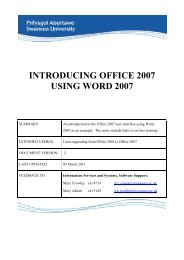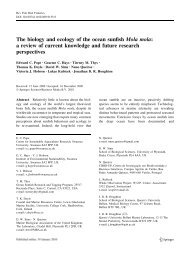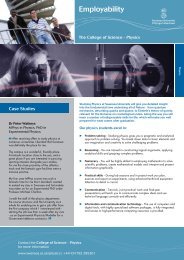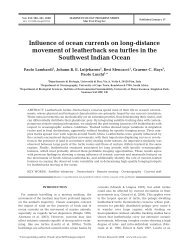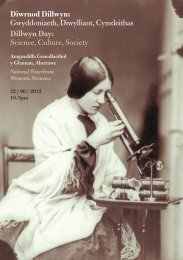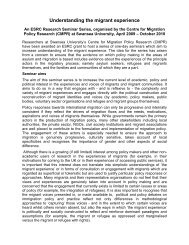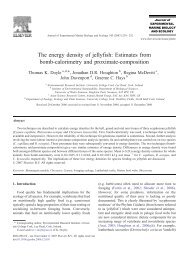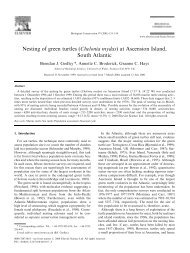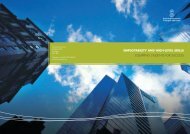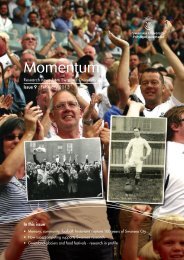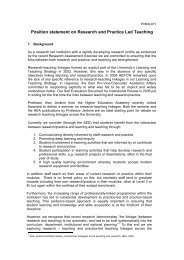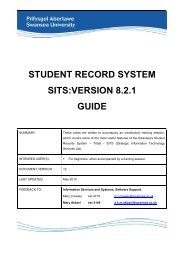ESRC Seminar Series - Briefing Paper 5 - Swansea University
ESRC Seminar Series - Briefing Paper 5 - Swansea University
ESRC Seminar Series - Briefing Paper 5 - Swansea University
You also want an ePaper? Increase the reach of your titles
YUMPU automatically turns print PDFs into web optimized ePapers that Google loves.
for a politics that doesn’t restrict political subjects just to “…responding to predetermined<br />
positions … but rather understands them as agents in the intercepting fields of multiple<br />
social justice agendas.”<br />
PANEL 2 Creating space for ‘the migrant voice’<br />
Chair: Dr Alex Rotas, Cardiff <strong>University</strong><br />
‘Nothing to do with us: class, ethnicity and power among Polish immigrants in<br />
UK’ - Dr Michal P. Garapich, Roehampton <strong>University</strong><br />
Dr Michal Garapich discussed the performance and articulation of meaning making practices<br />
through the medium of ethnicity, with specific reference to Polish immigrant communities in<br />
the UK. For Michal “…ethnicity is not something that people have it is rather what people<br />
do, and this means that it is a strategic resource that can be deliberately showed off in<br />
particular situations and might be under communicated in other situations” Refering to the<br />
title of the seminar, Michal observed that, “Who tells the story?” is only one aspect of the<br />
dilemma because it is not possible to abstract the teller of the story from the listener.<br />
Furthermore, the dominant story “…is a complex outcome of both internal competition for<br />
power, prestige and recognition within a particular group, … as well as what is the cultural<br />
and social environment that renders some stories more valuable and acceptable than<br />
others.”<br />
Michal illustrated this point with reference to the dominance of the ‘soldier narrative’ which<br />
constructs Polish and Eastern European Migrants as a model group for other migrants with<br />
regard to integration. Michal further developed this theme and applied it to the situation of<br />
London-based British Polish immigrant communities, arguing that there are particular<br />
dominant traits in discourses of emigration and Polish culture, one of which is the<br />
dichotomy between the economic and the political. Through his research, Michal has<br />
identified strong tensions and conflict between established groups of British Polish<br />
immigrants and those who arrived more recently as a result of the EU enlargement in 2004.<br />
Michal suggested that the dominant discourse excludes stories that do not fit or contradict<br />
the soldier narrative and its associations with productivity and work ethic, an example being<br />
the real and significant growth of poverty and destitution among Eastern European<br />
immigrants in the UK.<br />
For Michal, this is demonstrative of the complex interaction of class and ethnicity that is<br />
utilised to reproduce and maintain the dominant power relations within an immigrant group<br />
and control access to social inclusion.<br />
‘Refugee community organisations and the creation of social capital: a case<br />
study’ - Alexa Kellow, Southampton <strong>University</strong><br />
Alexa Kellow began by outlining the research project from which her case study was taken.<br />
She then introduced the notion of social capital, concluding with some findings and<br />
examples.<br />
Alexa’s research focuses on refugee led community organisations (RCOs) and has examined<br />
in depth, the process by which RCO’s increase access to social capital. Her case study was<br />
undertaken over a period of six months with an RCO for Albanian speakers and was used<br />
to develop a survey of London based RCOs. Alexa applied Social Capital Theory (the idea<br />
that people have social as well as political, financial or human capital which they can use as a<br />
resource in various ways) as developed by both Putman and Woolcock to the data from the<br />
case study. Woolcock identified three kinds of social capital:<br />
• Bonding social capital - connections between close friends and family;<br />
• Bridging social capital - connections between remote associates or friends; and<br />
• Linking social capital - connections to or between formal institutions.<br />
Alexa emphasised the importance of recognising that a social capital connection does not<br />
necessarily result in a resource. In light of this, her analysis separates resources and



